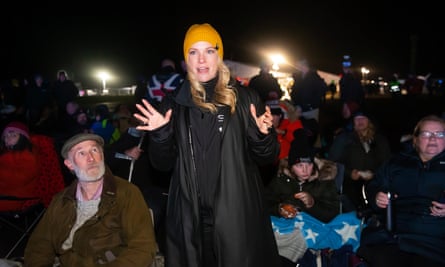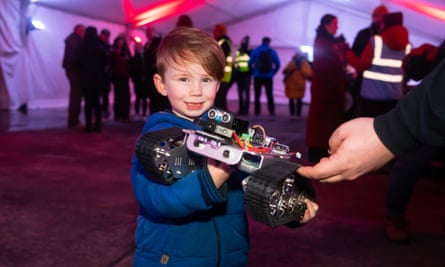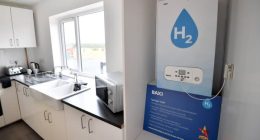A historic space mission that took off from Cornwall has ended in bitter disappointment after a rocket carrying the first satellites launched from British soil failed to reach orbit and was lost.
To whoops and cheers from a crowd that had gathered at Spaceport Cornwall to watch the launch, a converted Boeing 747 called Cosmic Girl took off on Monday night and headed out across the Atlantic.
It successfully released its rocket, called LauncherOne, carrying a payload of nine satellites off the south coast of Ireland.
But shortly after Virgin Orbit, which is leading the mission, announced there had been “an anomaly” and the rocket failed to reach the required altitude.
The rocket and satellites were lost but the UK Space Agency insisted they posed no danger and were expected to burn or break up over the north Atlantic. The 747 returned to Cornwall safely.
Matt Archer, the director of commercial spaceflight at the UK Space Agency, said he was hugely disappointed that the mission had not been successful – but still pleased that the first launch of satellites from Europe had taken place from British soil.
He said the first part of the two-stage rocket launch went well but the second stage failed and while the rocket reached space it did not attain the necessary altitude and orbit.
“We don’t know what caused the anomaly but we achieved a launch,” he said. “A lot of positives have been achieved. Space is hard. We knew that this had a risk of failure. Launches don’t always work. We’ve created the conditions for launch here. We’ve shown we can do it and we’ll look to do it again”
Archer confirmed the rocket and satellites were lost. He said the trajectory of the rocket was on suggested there would be no risk to people. “The trajectory puts it over main bodies of water, so it’s completely safe,” he said.
The Space Agency had been proud at the prospect of the UK launching the first satellites in Europe. Archer insisted: “We launched. There are lots of positives. We will take that forward.”
The Start Me Up mission had been heralded as the start of a new space era for the UK.
Cosmic Girl, flown by RAF test pilot Sqn Ldr Matthew Stannard, took off just after 10pm and carried out a “fin wiggle” to clear ice from LauncherOne over the Atlantic. It reached its destination south of Ireland and followed a looping “racetrack” pattern as the crew waited for the final go/no-go call.
Back in Cornwall spectators did a “conga” dance around a replica of the rocket at the perimeter of the spaceport while up to 75,000 people watched a livestream of the flight.
When the “go” call came at 11.10pm, LauncherOne was released at 10,700 metres (35,000ft), falling for a few seconds before igniting and shooting southwards, gathering speed and altitude as it headed towards the Canary Islands.

Cosmic Girl banked sharply away, a stomach-turning manoeuvre. The spectators in Cornwall watching via a big screen whooped as the plane headed back towards the UK.
LauncherOne did what is known as a “barbecue roll” to make sure neither side got too hot. The satellites, none bigger than a washing machine, were due to be released from LauncherOne around an hour later.
Virgin Orbit initially tweeted: “LauncherOne has … successfully reached Earth orbit! Our mission isn’t over yet, but our congratulations to the people of the UK! This is already the first-ever orbital mission from British soil – an enormous achievement.”
Twenty-eight minutes later it tweeted: “We appear to have an anomaly that has prevented us from reaching orbit. We are evaluating the information.” It removed the earlier tweet.
Melissa Thorpe, the head of Spaceport Cornwall, expressed disappointment but added: “We’re a resilient team. This isn’t the first time we’ve been knocked but this is the biggest definitely. We’ll get up and we’ll go again.
“It’s just absolutely devastating, and we put our hearts and soul into this. The next time we go it will be even better.”
The British Astronaut Tim Peake tweeted: “So disappointing – but getting into space is hard and valuable lessons will be learned.”
Earlier there had been a festival atmosphere as more than 2,000 people turned up to watch the launch, which was being seen as a missing link in the UK satellite industry.
Until now, the UK has been strong at manufacturing satellites and interpreting the data they yield, but has not been able to launch them.

Given that the mission was named after a Rolling Stones song, it seemed appropriate that the event had the trappings of a music festival.
There were food stalls and a merchandise stand selling beanies, T-shirts, even a Cornish Spaceport-branded bellyboard.
There was even a marquee with a silent disco, a useful way of staying warm on a chilly night.

As clouds cleared and a near-full moon appeared, the silent disco played David Bowie’s Space Oddity, Elton John’s Rocket Man and the Thunderbirds theme.
Adrian Grint, 46, an IT worker from St Austell, had turned up in an alien costume and held a sign reading: “Take me home.” He said: “I dress up every now and again. This is massive for Cornwall, very forward-thinking. Everything is based on tourism in Cornwall – this is different.”
Simon and Sam had brought their children, Dominic, four, and Amber, two. Simon said: “We’re from St Austell – Cornish clay country. This is good for Cornwall. With mining gone we don’t have much of an identity any more. This helps put us back on the map.”

Among those with satellites onboard were the Ministry of Defence, the sultanate of Oman, the US National Reconnaissance Office and British startups including Space Forge, which is developing reusable satellites. The Space Agency said it would be up to Virgin Orbit to discuss compensation for the loss of the satellites.
Spectators were in melancholy mood as they left.
Kirsty Landragin, of St Columb Major, Cornwall, said: “It’s a real shame – all this excitement and build up and then an anomaly.”
Mike White, from Par in Cornwall, said: “That’s what discovering and pioneering is all about. It reminds everyone it’s complicated. They’ll get it right next time.”
Read More: World News | Entertainment News | Celeb News
Guardian







